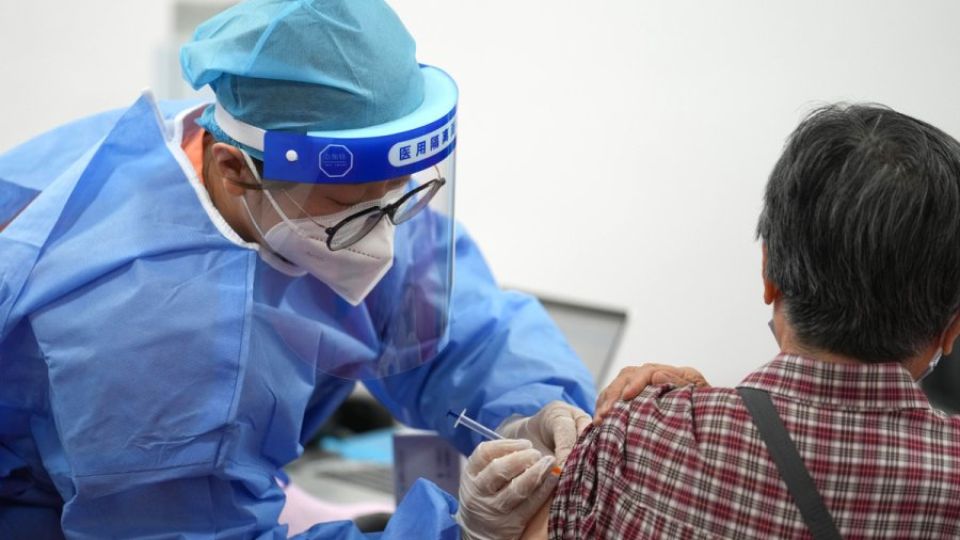December 29, 2022
BEIJING – Targeted inoculation programs, medical innovations drive fight against COVID-19
From offering the world’s first inhaled COVID-19 vaccines and developing Omicron-targeted vaccines to rolling out second booster shots and targeted immunization plans for seniors, China’s vaccination efforts have gained steam this year, according to authorities.
The country started 2022 with a strong arsenal to fight COVID-19, with seven domestically developed vaccines available. Two of the vaccines were deployed globally after gaining approval for use from the World Health Organization.
Chinese researchers also raced to provide a wider variety of vaccines, including doses administered through the mouth or nose, to keep up with new mutations of the novel coronavirus.
“Recently, China granted conditional approval to five COVID-19 vaccines and emergency use authorization to eight vaccines,” Huang Guo, deputy director of the National Medical Products Administration, said at a news briefing on Dec 20.
Li Bin, vice-minister of the National Health Commission, said that China has maintained a steady pace in updating its COVID-19 policy.
“We have advanced vaccination and booster shot campaigns, developed and approved a number of vaccines and provided different combinations,” he said.
On Sept 4, China became the first country to grant emergency-use approval to an inhalable COVID-19 vaccine made by CanSino Biologics based in Tianjin. The vaccine can only be used as a booster.
The vaccine delivers a dose through a puff of air from a nebulizer and is inhaled through the mouth.
Sunney Xie Xiaoliang, a biophysical chemist at Peking University and an academician of the Chinese Academy of Sciences, said that by stimulating immune responses in the nasal cavity where respiratory pathogens first enter, inhaled or nasal spray vaccines are showing promise in fending off infections.
“Using it as a booster shot can also trigger higher levels of humoral immunity as well as cellular immunity, which are potentially capable of clearing the virus within a shorter period,” he added.
On Dec 2, a nasal spray vaccine jointly developed by Xiamen University in Fujian province, Hong Kong University and the Beijing Wantai Biological Pharmacy Enterprise was also cleared for emergency use.
The nasal spray’s main use is as a second booster for the elderly, according to the State Council’s Joint Prevention and Control Mechanism.
In Beijing’s Xicheng district, Tang Ying, a community health center worker, said entire afternoons are usually assigned to delivering nasal spray vaccines. The center also provides door-to-door services for seniors.
More vaccines using different technologies or providing stronger protection against COVID-19 variants are in the pipeline.
As the highly transmissible but less virulent Omicron variant spreads across the country, clinical trials on three domestically developed inactivated vaccines tailored to counter it have begun on the Chinese mainland and in the Hong Kong Special Administrative Region and the United Arab Emirates.
Another approach being tested by scientists is vaccines designed to protect against multiple strains. Authorities said that three out of the nine multivalent vaccine candidates have entered the third stage of clinical trials.
China’s quest to invent vaccines based on the messenger RNA technology is also making progress.
Walvax Biotechnology, a drugmaker based in Yunnan province, said on Sept 30 that its mRNA vaccine, developed with Suzhou Abogen Biosciences, had been approved for emergency use in Indonesia.
The company said recently that it has built a production plant capable of manufacturing mRNA vaccines in Yuxi, Yunnan.
Health authorities have also fine-tuned the country’s immunization protocols this year, based on the latest studies on vaccine efficacy and safety.
Zheng Zhongwei, head of the country’s vaccine development task force, said during a recent interview that the Chinese Center for Disease Control and Prevention has monitored adverse reactions to the 3.4 billion doses administered on the mainland. The rate of adverse reaction of COVID-19 vaccines is on par with that of other commonly administered vaccines, while the rate among the elderly is slightly lower than that of younger people, he said.
Globally, China has supplied over 2.2 billion vaccine doses to more than 120 countries and international organizations, Zheng added.
With major COVID-19 control policy adjustments underway, experts said that the emphasis of vaccination work in the near future is further boosting immunization coverage among the elderly and vulnerable groups.
As of Dec 13, the mainland had fully vaccinated 90.37 percent of its population, but the rate was 86.6 percent for those age 60 and above and 66.4 percent for those age 80 and above.
On Nov 29, the State Council rolled out an action plan dedicated to expanding vaccination among the elderly. New measures include approving different combinations of vaccine doses, requiring localities to survey their elderly population and improving the convenience of services.
This month, China also announced it will offer a second booster for the most vulnerable groups, including the elderly, those with severe preexisting illnesses and those with conditions that compromise their immune system.
Zhang Shuo, a local official of Yinghai township in Beijing, said during an interview with People’s Daily on Tuesday that in recent days elderly people appear more willing to get vaccinated.
“Previously, quite a number of seniors and their family members had concerns on whether vaccination would worsen their preexisting illnesses and it took great efforts to persuade them,” he said.
“But this year, we can tell that their attitudes have obviously changed and they sincerely want to be vaccinated. Most just consult us about questions such as whether high blood pressure and heart disease patients are eligible for immunization,” he added.


